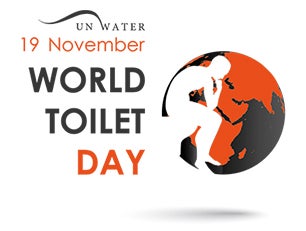What would motivate you to install a toilet in your home? Most rural families in Rajasthan have defecated in open fields for generations. Watch how a campaign that appeals to human dignity has spurred whole communities to change their lives and improve not only their health, but their peace of mind.
 Today marks the second annual UN World Toilet Day, an important opportunity to promote global efforts to achieve universal access to sanitation by 2030. With a focus on equality and dignity, this year, World Toilet Day aims to highlight sanitation as a global development priority, especially for women and girls who must compromise their dignity and put their safety at risk when lack of access to sanitation forces them to defecate in the open.
Today marks the second annual UN World Toilet Day, an important opportunity to promote global efforts to achieve universal access to sanitation by 2030. With a focus on equality and dignity, this year, World Toilet Day aims to highlight sanitation as a global development priority, especially for women and girls who must compromise their dignity and put their safety at risk when lack of access to sanitation forces them to defecate in the open.
Motivating Through Dignity Improves Sanitation in Rajasthan
Ending poverty by 2030 and boosting shared prosperity—the World Bank Group’s twin corporate goals—is possible only if we continue pressing to fully understand such obstacles to gender equity and service delivery.
Below is a round-up of some of the World Bank Group content around World Toilet Day:
- Feature story: On World Toilet Day, Focus is on Equality and Dignity
- Feature story: Philippines: Stopping the scourge of open defecation
- Video: Motivating Through Dignity Improves Sanitation in Rajasthan
- Blog: Taking Sanitation to Scale in Vietnam
- Blog: Philippines: Owning a Toilet is a Sign of Progress
- Event: Using subsidies to encourage adoption and use of hygienic latrines among the poorest in rural Bangladesh


Join the Conversation